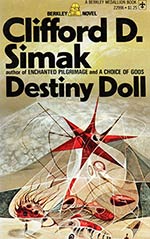
![]() BigEnk
BigEnk
2/7/2025
![]()
An enjoyable piece of pulp writing from the middle of Simak's writing years. It has a wonderfully bizarre setting and creatures that, combined with solid pacing, make it easy to read and continue reading.
A group of adventurers quest for a prize of unknown value and identity. Their only direction is from a blind telepath who has a connection to an unknown entity across the galaxy. The journey brings them to a planet that latches to their craft with a tractor beam and bring them to a towering, silent, glittering white city that is patrolled by creatures that resemble wooden horses. There are giant intelligence collecting trees, an octopus/centipede creature who has the powers of a demigod, roving bands of centaurs that play polo in the desert, and robotic rocking horses entities that serve as a mode of transportation. Not the weirdest book that I've read, but within the upper percentile for sure.
The first three quarters of Destiny Doll is mostly an adventure story. It hits a lot of the beats that you would expect but doesn't feel especially bland doing so. Towards the end, the story evolves into a more reflective work, as the main character is forced to question his choices and tie the pieces of the mystery together. Both sections were enjoyable for their own reasons, but neither stood out as excellent. The ending left me feeling unsatisfied. There's some pretty big reveals towards the end, regarding the treasure the group set out looking for and the planet itself, neither of which are explored to any degree. The novel finishes too abruptly.
The characters, unfortunately, are forgettable. The insufferable main character, Captain Ross, is especially grating, as he complains ceaselessly about his companions. I'm sure that there is some thematic reasoning for this, but I simply couldn't stand it after the first quarter of the book. It's hard to find a character interesting if they exclusively whine all the time. The rest of the characters are not memorable but are all unique compared to each other and serve their role well enough. The prose is passable but unremarkable. Certain passages, when Simak tries to write with style, either come out sounding like trite, feel awkward in their structure, or are
There's a lot of discussion in the book of about personal fulfillment, as each character in turn finds their own personal version of nirvana. What can we do to help each other find that place where we feel called too? What should we do if we don't agree with someone else's destiny? How can we find our own nirvana if we feel lost or alone? I'm glad that there is some form of theme, even if it's not it isn't the best explored.
Not the worst novel from Simak, but not the best either, though I would say that it slides somewhere towards the positive end of that spectrum.